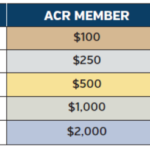Imagine you’ve just heard a compelling presentation urging all ACR members to contribute to RheumPAC, the ACR’s political action committee. RheumPAC’s mission is to support politicians who support issues important to rheumatologists. You are impressed by the role RheumPAC has played in a number of issues you support. Just as you’re writing a check, you learn that contributions to RheumPAC may go to political candidates who not only support issues that promote rheumatology, but who also hold positions on issues (including abortion and the Affordable Care Act) you find objectionable. Will your contribution to RheumPAC in support of your patients and your profession also violate your personal ethics? If so, how do you resolve this conflict?
How Politics Works
As a volunteer for the ACR, I [Dr. Mundwiler] have had the privilege of serving on both the Government Affairs Committee (GAC) and the Committee on Ethics and Conflict of Interest. Serving first on the GAC certainly influenced my perspective. Before getting involved with this committee work, I was naively idealistic. I thought the political process would proceed in a logical and linear manner: We would generate ideas that would benefit rheumatology, share ideas with politicians and staff, and watch our ideas be transformed into action.
I quickly came to understand, however, that the process was less direct and not necessarily based on our priorities. Instead of a process based on the merits of our ideas, I was confronted by a process whose chief goal is to maximize time with politicians and staff. The actual process is anything but logical and linear: We hope they notice and consider our ideas, hope that they remember our recommendations, hope that they have at least an understanding of what rheumatologists do and, ultimately, hope that what we find important influences legislation.
Those of us who have chosen to serve in a political capacity have to maintain faith that our efforts will one day make a positive change, all the while knowing that a lot of our efforts may not. The only predictable result is that a lack of participation with legislators and other government leaders will lead them to pay little or no attention to issues important to rheumatologists.This result may come with significant detriment to our patients and to us.
Overlapping Goals
There are several ways to generate exposure to the issues rheumatologists support. I found, however, that the quality time and exposure—where relationships are forged and personal connections are made regarding our issues—were at fundraisers. My epiphany was understanding that advocates and politicians actually have some overlapping goals. Advocates generate and use funds to help gain awareness for their issues; elected officials have to generate and spend considerable resources to gain exposure, communicate their message and campaign. Regarding these goals, both advocates and politicians also vocalize a similar ethical struggle. Both would rather be judged on the merit of their actions than on their ability to generate funds. The system, however, clearly rewards fundraising.
